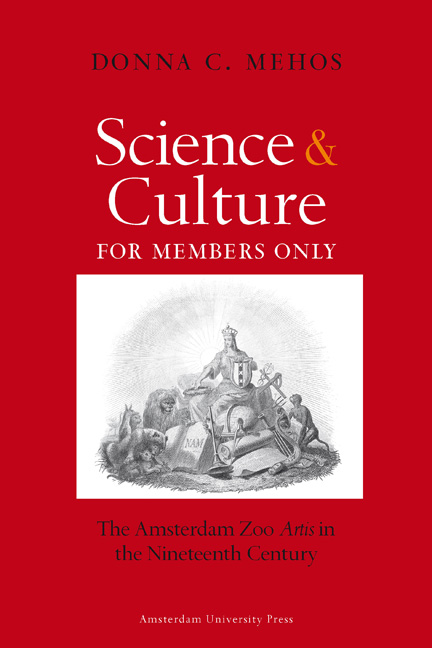Book contents
- Frontmatter
- Dedication
- Contents
- Acknowledgments
- Introduction The Nation and Nature in Middle-Class Culture
- Chapter 1 Structuring a New Generation’s Scientific Society
- Chapter 2 Private Science and the Public Interest
- Chapter 3 Internationalizing Nationalist Science
- Chapter 4 Science Joins Cultural Life
- Conclusion Science, Colonial Expansion, and National Identity
- Appendix: Members of the Artis Board of Directors, 1838-1870
- Notes
- List of Illustrations and Color Plates
- Bibliography
- Index
- Plate Section
Chapter 3 - Internationalizing Nationalist Science
Published online by Cambridge University Press: 20 January 2021
- Frontmatter
- Dedication
- Contents
- Acknowledgments
- Introduction The Nation and Nature in Middle-Class Culture
- Chapter 1 Structuring a New Generation’s Scientific Society
- Chapter 2 Private Science and the Public Interest
- Chapter 3 Internationalizing Nationalist Science
- Chapter 4 Science Joins Cultural Life
- Conclusion Science, Colonial Expansion, and National Identity
- Appendix: Members of the Artis Board of Directors, 1838-1870
- Notes
- List of Illustrations and Color Plates
- Bibliography
- Index
- Plate Section
Summary
Introduction
Without reaping any obvious benefits, the Amsterdam bourgeoisie financed the development of the professional scientific identity of Artis. Its members, content with their access to the zoological garden and museum, also supported the scientific endeavors of their zoological society to build the institution that was to become “the most beautiful pearl in the crown of the city of Amsterdam.” During the second decade of Artis, the Board of Directors – with some prodding from Westerman – consciously expanded the serious scientific commitment of the zoo. The natural history activities of Artis had to extend from displays aimed at amateurs, to professional zoological studies so that Artis could compete with rival institutions in neighboring countries. Only after Dutch science was recognized by scientists abroad would the zoological society become a source of national pride. To achieve these scientific and patriotic goals, the Board of Directors employed a successful strategy in which scientific investigations supported by Artis placed the zoo on the European map of respectable, serious zoological institutions. How would this new and unique type of institution integrate itself within the mainstream of international science? In its early decades, Artis developed the requisite facilities for scientific investigation: it acquired research collections; it founded specialist journals that were widely read and well-reviewed; and its library became an important resource for researchers. Without having direct ties to academic science, Artis appealed to professional naturalists whose involvement with the zoo helped Artis become a center for zoological research. The ultimate legitimation of its scientific achievements came in 1877, when the Amsterdam Atheneum Illustre was elevated by the state to the status of a degree-granting university and the zoo collaborated with the new university. After 1877, Amsterdam medical school students at the new municipal university received their anatomy lessons on the premises of the Amsterdam Zoo. Furthermore, a chair in zoology was created, and the first professors of zoology in Amsterdam also held official posts at Artis where scientific work continued to revolve around both the living and preserved natural history collections.
While the Amsterdam Zoo was founded “to advance natural historical knowledge in a pleasant and illustrative manner,” the precise meaning of this phrase remained unarticulated throughout the zoo's first decade.
- Type
- Chapter
- Information
- Science and Culture for Members OnlyThe Amsterdam Zoo Artis in the Nineteenth Century, pp. 59 - 90Publisher: Amsterdam University PressPrint publication year: 2006



